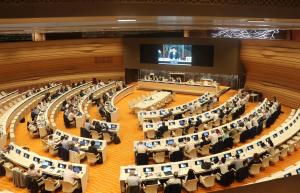
For many people around the world, the work and achievements of the United Nations remain in the realms of grand summits of heads of state on pressing global issues, of diplomatic brokering of peace agreements, of urgent humanitarian interventions for people in the greatest need, and other high-profile actions we can see in the news. But this only offers a glimpse of the huge breadth of work undertaken across all kinds of sectors, which is often of a highly technical nature, and which brings very tangible benefits for millions – or sometimes billions – of lives every single day.
A great example of this is cooperation at the UN on vehicle regulations – the standards for the construction and testing of motor vehicles and the parts and systems they are made of, which dates right back to the early days of UNECE in the aftermath of the second world war.
This month, a unique intergovernmental body called the World Forum for Harmonization of Vehicle Regulations (a UNECE Working Party also known as “WP.29”) gathered in Geneva. Forever at the forefront of international efforts to make vehicles safer and less polluting, countries reached a breakthrough with the world’s first international effort to regulate deadly particulate matter pollution from brakes.
The session marked the 25th anniversary of the 1998 Agreement on Global Technical Regulations for Wheeled Vehicles, Equipment and Parts which can be fitted and/or be used on Wheeled Vehicles (known for short as the 1998 Agreement). Despite its long name, its value is quite simple: a common approach to develop new or harmonize existing technical regulations on vehicles’ environmental and safety performance.
Why is this harmonization so important? When the safety and environmental regulations which must be met before a vehicle or component can be sold in a given market differ from nation to nation, automotive manufacturers need to satisfy as many different sets of rules as the number of nations they choose to sell in. This creates an expensive, time consuming, and frequently redundant global system for certifying vehicles and components. Such a process can increase costs significantly, while not improving vehicle safety or environmental performance.
Having started with 5 signatory Parties 25 years ago, the 1998 Agreement now has 39 Contracting Parties, including the USA, the EU, China, Japan, India, as well as most major automotive markets. Over 70 countries, plus multiple NGOs, participate in its work. This means that we are working towards an even broader consensus to make vehicles safer, more environmentally friendly and affordable. This will contribute to making available the highest standards of mobility to citizens around the world.
Crucially for the highly connected global automotive sector which employs some 50 million people, common tools like UN Global Technical Regulations generate huge economies of scale.
As a sign of value of this work, the G7 Transport Ministers’ communiqué issued at their Japan meeting this month recognized “that the UNECE’s World Forum for the Harmonization of Vehicle Regulations (WP.29) plays an important role in promoting safety and advancing technological innovation through development of internationally harmonized technical regulations, standards and guidelines for automated and connected vehicles, air pollution and decarbonization technologies in the road sector, such as safety and battery durability of electrified vehicles, safety of hydrogen fuel cell vehicles, and GHG emissions assessment over the entire vehicle life cycle. We intend to continue and strengthen our efforts in WP.29 to promote safe, transparent, and science based technical regulations, standards and guidelines.”
The 1998 Agreement, together with the 1958 Agreement and 1997 Agreements that WP.29 administers, have played an essential role in formulating science-based automotive safety and environmental Regulations from which we all benefit. I encourage all nations to accede to the Agreements and apply their provisions and call on auto manufacturers to meet minimum UN safety and environmental standards, including in developing countries, where more than 90% of road deaths occur.
As we look to the future, we need to continue to confront challenges. UNECE’s WP.29 is the platform committed to and capable of facilitating our international collaborative efforts. It possesses the technical competence to overcome emerging challenges, including to tackle the road transport sector’s contribution to climate change (which accounts to 76% of the total GHG emissions of transport).
Although we may not all be aware of the impact of this joint work at the UN on our everyday lives, it is an example of multilateral cooperation at its best, and we and can take pride in what we achieve together by pooling our expertise and engaging with open communication among all stakeholders.

